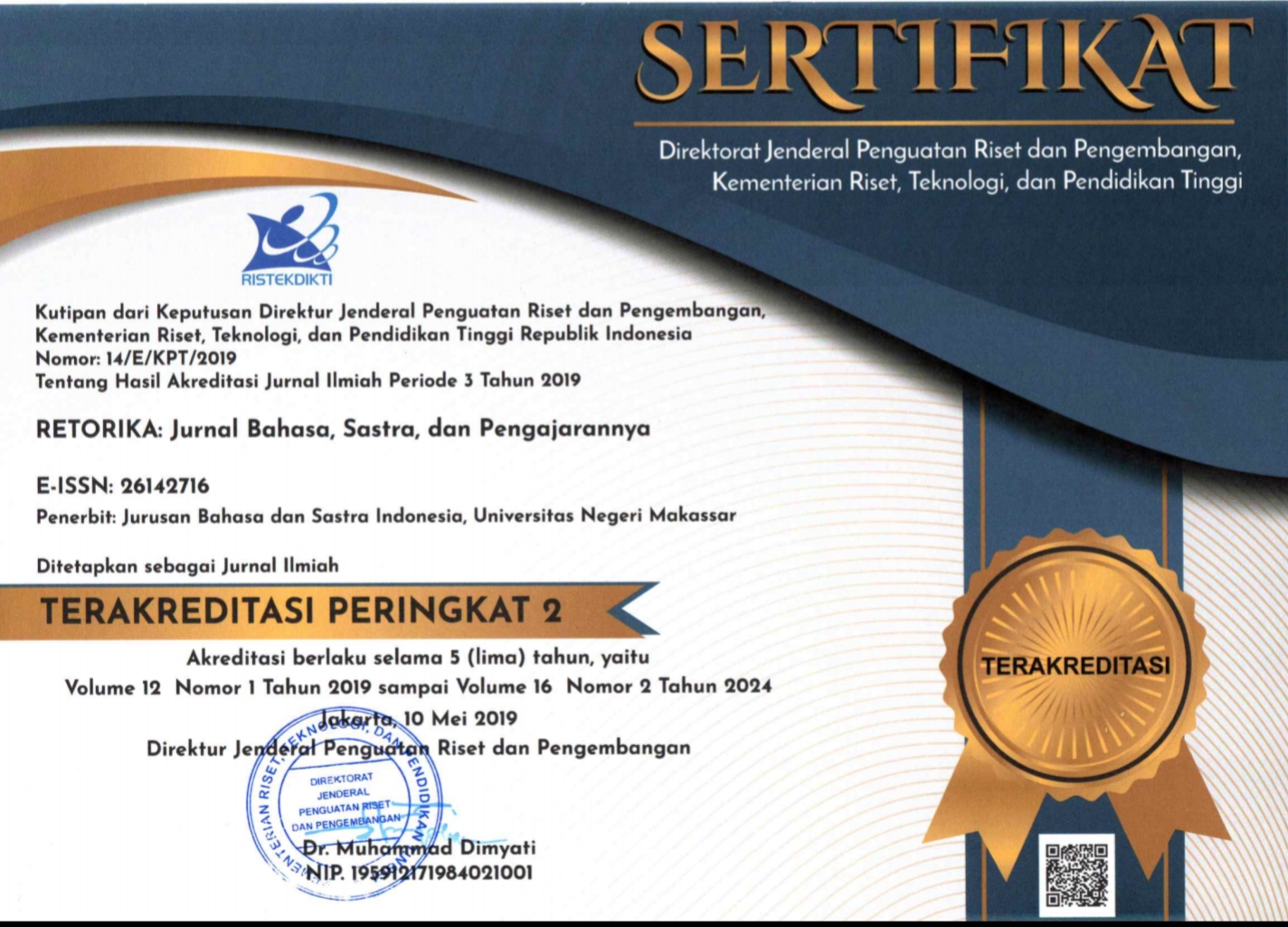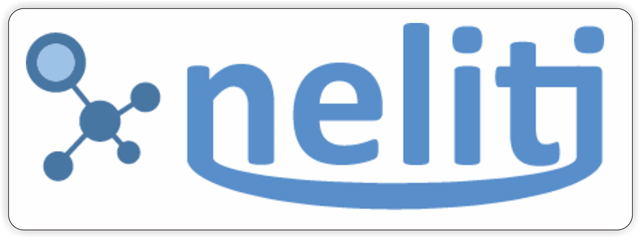INTERNALIZATION OF INCLUSIVE EDUCATION THROUGH CHILDREN'S LITERATURE WITH DISABILITY THEME
(1) Universitas Negeri Yogyakarta
(2) Universitas Negeri Yogyakarta
(3) Universitas Negeri Yogyakarta
(*) Corresponding Author
DOI: https://doi.org/10.26858/retorika.v17i1.53580
Abstract
The aim of this study is to describe the internalization of inclusive education through children's literature with the theme of disability. The research data are words, phrases and sentences in the children's book Meine Füße sind der Rollstuhl, which shows the internalization of inclusive education values, shown by the character Margit, and other characters. The research data source is the children's story Meine Füße sind der Rollstuhl, written by Franz-Joseph Huainigg, published in 2003. Data collection involved utilizing note-taking techniques to capture key aspects of the narrative. Subsequently, all gathered data underwent analysis using both a referential identity approach and reflective, introspective methods. The results of this study show that literary works, especially children's literature, can be a beneficial media for internalizing inclusive education. The introduction and internalization of inclusion education values through children's literature with disability themes is relevant to develop children’s positive character. It is in consonance with what Horace stated about the function of literature that not only entertains but also educates. The internalization of inclusive education values through disability-themed children's literature, both receptively and productively, is expected to help overcome the problems of implementing inclusive education in Indonesia so that equality in education, as all people aspire to, can be realized.
Keywords
Full Text:
PDFReferences
Boleng, M. (2018). An Analysis of Human Values and Character Building in Indonesia Reflected in. E3L: Journal of English Teaching, Linguistic, and Literature, 1-9.
Chowdhury, P. R. (2011). The Right to Inclusive Education of Persons With Disabilities: the Policy and Practice implications. Asia-Pac. J. on Hum. Rts. & L., 12, 1.
Cologne, K. (2022). Is Inclusive Education Really fFor Everyone? Family Stories of Children and Young People Labelled With ‘Severe and Multiple’ or ‘Profound’ ‘Disabilities’. In Research Papers In Education. Vol. 37( 3), 395–417.
Ediyanto, E., Ramadhani, R.S., Fitrasari, B.D., Kenila, E., Sunandar, A., Hastuti, W.D., & Suhendri, S. (2023). The Problems in the Implementation of Inclusive Education in Primary Schools. Journal of ICSAR.
Halimah, L et.al (2020) StorytellingTthrough “Wayang Golek” Puppet Show: Practical Ways in Incorporating Character eEducation in Early Childhood. Cogent Education, 7:1, DOI: 10.1080/2331186X.2020.1794495.
Holzfeind, L. (2022). Franz Joseph Huainigg: “Jeder profitiert von Inklusion”. Online. https://www.kleinezeitung.at/kaernten/villach/6177797/Sommergespraech-Villach_Franz-Joseph-Huainigg_Jeder-profitiert , accessed on 13 June 2023.
Huainingg, F.-J. (2003). Meine Fuße sind Rolstuhl. München: Annette Betz im Ueberreuter Verlag.
Kefallinou, A., Symeonidou, S. & Meijer, C.J.W. Understanding The Value of Inclusive Education and Its Implementation: A Review of The Literature. Prospects 49, 135–152 (2020). https://doi.org/10.1007/s11125-020-09500-2.
Kurwinkel, T& Schmerheim, P. (2020). Handbuch Kinder- und Jugendliteratur. Berlin: J.B. Metzler.
Kümmerling-Meibauer, B. (2017). Kinderliteratur, Kanonbildung und Literarische Wertung. Stuttgart: J.B. Metzler.
Luukka, E. (2023) Meanings Attributed to Literature In Language Education. The Language Learning Journal, 51:1, 18-32, DOI: 10.1080/09571736.2021.1922491.
Merrigan, C & Senior, J. (2023) Special Schools at the Crossroads of Inclusion: Do They Have a Value, Purpose, and Educational Responsibility in an Inclusive Education System?. In Irish Educational Studies, 42:2, 275-291, DOI: 10.1080/03323315.2021.1964563.
Muassommah, et.al. (2020). Believe in Literature: Character Education for Indonesia's Youth. In Universal Journal of Educational Research 8(6): 2223-2231.
Mumpuniarti. (2016). Pembentukan Karakter Mandiri Bagi Penyandang Disabilitas Kecerdasan dalam Kapasitas Kemanusiaan. Jurnal Pembangunan Pendidikan: Fondasi dan Aplikasi Volume 4, No 1, Juni 2016 (59-66), 59-66.
Nurgiyantoro, B. (2012). Sastra Anak: Pengantar Dunia Anak. Yogyakarta : UGM Press.
Parr, M., Campbell, T. (2012). Using Story as Sites of Dialogue, Disillusionment, and Development of Dispositions to Support Inclusive Education. Creative Education, 341-347.
Paseka, A. & Schwab, S (2020) Parents’ Attitudes Towards Inclusive Education and Their Perceptions of Inclusive Teaching Practices And Resources. European Journal of Special Needs Education, 35:2, 254-272, DOI: 10.1080/08856257.2019.1665232.
Paul, T., Di Rezze, B., Rosenbaum, P., Cahill, P., Jiang, A., Kim, E., & Campbell, W. (2022). Perspectives of Children and Youth With Disabilities and Special Needs Regarding Their Experiences in Inclusive Education: A Meta-Aggregative Review. Frontiers in Education, 7(Special Educational Needs). https://doi.org/10.3389/feduc.2022.864752.
Poernomo, B. (2016).The Implementation of Inclusive Education in Indonesia : Current Problems and Challenges, in American International Journal of Social Science.Vol 3 (5), 144-150.
Rahman, R., Sirajuddin, S., Zulkarnain, Z., & Suradi, S. (2023). Prinsip, Implementasi dan Kompetensi Guru dalam Pendidikan Inklusi. Aksara: Jurnal Ilmu Pendidikan Nonformal, 9(2), 1075-1082.
Salmela-Aro, K. (2009). Personal Goals And Well-Being During Critical Life Transitions: The Four C’s—Channelling, Choice, Co-Agency, and Compensation. Advances in Life Course Research, 14(1-2), 63–73. doi:10.1016/j.alcr.2009.03.003.
Sayidiman, Ramli, A., & Ihsan, A. (2022). Representasi Fungsi Nilai Kemanusiaan sebagai Dasar Pendidikan Karakter Dalam. Jurnal Publikasi Pendidikan, 2(03), 271-278. Retrieved Mei 18, 2023.
Sudaryanto. (2015). Metode dan Aneka Teknik Analisis Bahasa. Yogyakarta: Sanata Dharma University Press.
Teodoro, A. (2020). Contesting The Global Development of Sustainable and Inclusive Education: Education Reform And The Challenges Of Neoliberal Globalization. Routledge.
Tiernan, B. (2022) Inclusion Versus Full Inclusion: Implications for Progressing Inclusive Education. European Journal of Special Needs Education, 37:5, 882-890, DOI: 10.1080/08856257.2021.1961197.
Turan, F & Ulutas, I. (2016). Using Storybooks as a Character Education Tools. In Journal of Education and Practice, Vol 7 (15), 169-176.
Turner, D. M. (2018). Picturing Disabilities in Eighteenth - Century England. In C. J. Kudlick, K. E. Nielsen, & M. A. Rembis, The Oxford Handbook of Disability History (pp. 327-350). New York: Oxford University Press.
Article Metrics
Abstract view : 92 times | PDF view : 15 timesRefbacks
- There are currently no refbacks.
Copyright (c) 2024 Isti Haryati

This work is licensed under a Creative Commons Attribution-NonCommercial 4.0 International License.
Published by:
Department of Indonesian Language, Faculty of Languages and Literature, Universitas Negeri Makassar in cooperate with Asosiasi Dosen Bahasa dan Sastra Indonesia (ADOBSI) and Ikatan Program Studi Pendidikan Bahasa dan Sastra Indonesia (IKAPROBSI).
Address: Department of Indonesian Language Office, DG Building Second Floor, UNM Parangtambung, Daeng Tata Raya Street, Makassar, South Sulawesi, Indonesia
 Email: retorika@unm.ac.id
Email: retorika@unm.ac.id

RETORIKA: Jurnal Bahasa, Sastra,dan Pengajarannya is licensed under a Creative Commons Attribution-NonCommercial 4.0 International License.
















